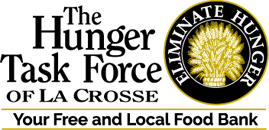The Hunger Task Force coordinates donations from approximately 520 donors and food drives and distribution to over 120 meal sites, food pantries, youth programs, and outreach sites in La Crosse, Vernon, Trempealeau, Monroe, Houston, Winona and Allamakee Counties.
In 2023, over 2,500,000 pounds of food was “recovered” and distributed to our partner agencies.
Food Bank vs. Food Pantry
The terms “food bank” and “food pantry” are commonly confused. A food pantry serves individuals and families by distributing food items directly to those in need.
The Hunger Task Force is a food bank. A food bank is an umbrella organization that collects, sorts, and distributes foods (including large quantities and bulk items) to a variety of meal sites, pantries, shelters, and other approved locations within a community. A food bank collects donated food and supports a variety of organizations and programs. We are FREE and LOCAL! We believe that collecting and distributing within our community keeps us strong. We do not charge our recipient programs for food, like other food banks, yet many choose to support us by annual donations.
Sustainability
Food recovery and redistribution is part of the sustainability movement. It is based on the idea of using excess food to feed people in need when they need it. It makes sense to use donated excess food when much of the unused food would end up in landfills. Up to one-fifth of America’s food goes to waste each year, with an estimated 130 pounds per person ending up in landfills. The annual value of this lost food is estimated at around $31 billion. But the real story is that roughly 49 million people could have been fed by those lost resources (USDA).
Food recovery plays a vital role in the growing sustainability trend. It allows producers and distributors to manage surplus products efficiently and ethically. Food recovery provides an outlet for such product to be delivered to the tables of the hungry through an efficient distribution process. Having one primary source of recovery and distribution to multiple food pantries and meal programs assures rapid and appropriate delivery and keeps surplus products out of our landfills. The Hunger Task Force can help manage the needs of its multiple partners through established communication channels and provide those organizations with product that meets the needs of their program.
A System That Works
We have a unique position in the regional food chain, providing professional distribution services to recycle surplus and used food. We are an umbrella organization, taking the leadership in recovering food and redistributing to partner programs, serving as “the food pantries’ food pantry.” We see redistribution of surplus food as a crucial sustainability issue. We must work together to ensure that food is not wasted, that there is no unnecessary cost in the food chain, and that all of our citizens receive the nourishment needed to thrive.
We have a 20-year history of being increasingly effective and efficient in the redistribution of surplus food to an ever-increasing number of programs–now over 120–that serve the hungry.
